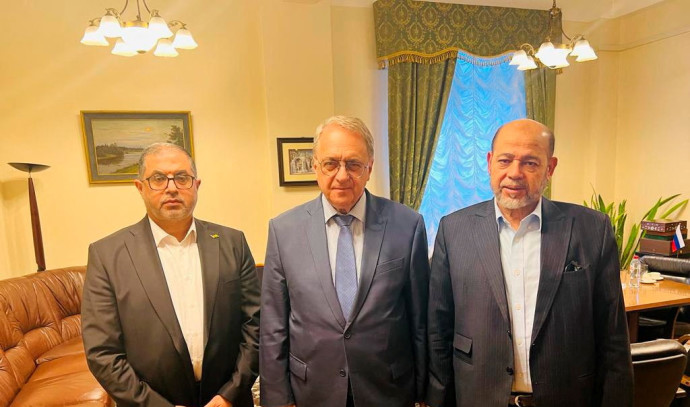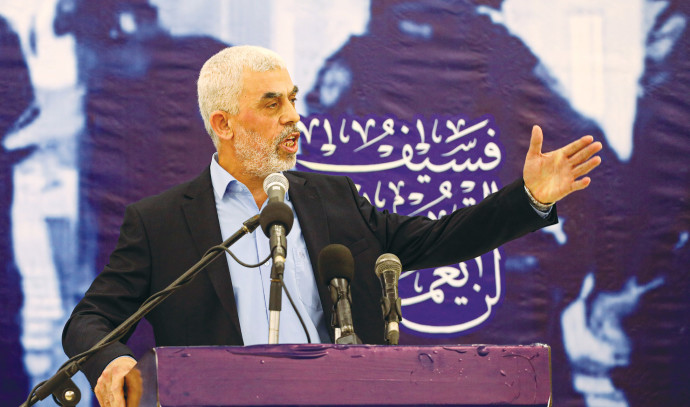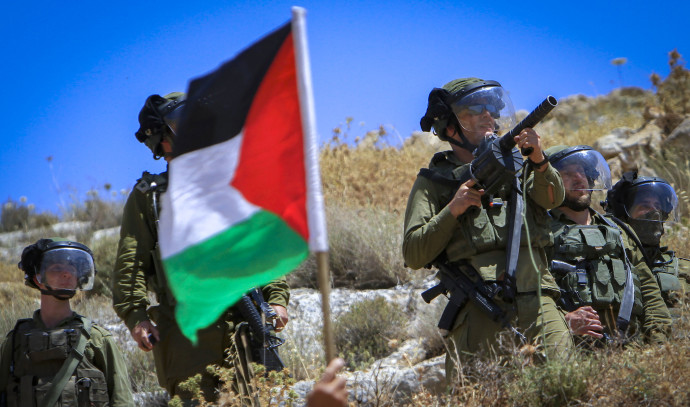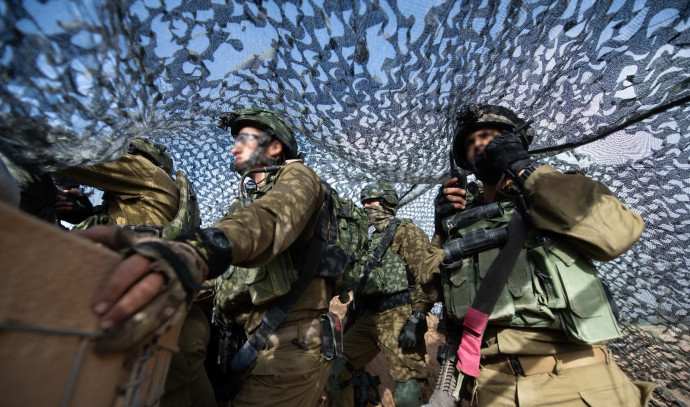world news
Russia demands release of hostages in talks with Hamas

Russian Deputy Foreign Minister Mikhail Bogdanov demanded the release of hostages held in Gaza in telephone calls on Sunday and Monday with Hamas and other Palestinian factions, the Russian foreign ministry said.
The statement followed a series of meetings and calls between President Vladimir Putin and Middle East leaders in the past week.
The ministry said Bogdanov’s conversations highlighted the military and humanitarian situation in Gaza, where Russia “confirmed its principled position on the need to cease hostilities and urgently resolve all humanitarian problems that have arisen, including the release of hostages.”
The statement did not make clear whether Russia sought the release of all hostages seized by Hamas during its Oct. 7 rampage into southern Israel or just the release of any Russian nationals among them.The minister spoke to senior figures in the Palestine Liberation Organisation (PLO), the Palestinian Democratic Union, the Popular Front for the Liberation of Palestine, and Hamas.
Bogdanov stressed the need to restore Palestinian unity “in the framework of the PLO” and reaffirmed Moscow’s support for a Palestinian state to co-exist alongside Israel, the statement said.
Russia called on Sunday for an international monitoring mission to go to Gaza to assess the humanitarian situation.
Condemning Israel’s response
Foreign Minister Sergei Lavrov said Moscow strongly condemned the Oct. 7 Hamas attack on Israel, but it was unacceptable for Israel to use that as justification for “the collective punishment of millions of Palestinian people with indiscriminate shelling.”
Analysts say the Gaza war has proved helpful to Russia by distracting the world’s attention from its war in Ukraine and making it harder for Kyiv to compete for Washington’s attention and military aid.
Putin has also used it as an opportunity to criticize the failings of US diplomacy in the Middle East and raise Russia’s own profile as a regional player with ties to all the main actors.
Putin has stepped up his own contacts in the past week, though the aim of his latest diplomatic flurry is not yet clear.
He spoke to Egyptian President Abdel Fattah al-Sisi on Saturday and Israeli Prime Minister Benjamin Netanyuhu on Sunday, having last week met the leaders of Saudi Arabia, the United Arab Emirates and Iran.
world news
Biden delays deporting Lebanese citizens from US over Hezbollah-Israel conflict

The United States is deferring the removal of certain Lebanese citizens from the country, President Joe Biden said on Friday, citing humanitarian conditions in southern Lebanon amid tensions between Israel and Hezbollah.
The deferred designation, which lasts 18 months, allows Lebanese citizens to remain in the country with the right to work, according to a memorandum Biden sent to the Department of Homeland Security.
“Humanitarian conditions in southern Lebanon have significantly deteriorated due to tensions between Hezbollah and Israel,” Biden said in the memo.
“While I remain focused on de-escalating the situation and improving humanitarian conditions, many civilians remain in danger; therefore, I am directing the deferral of removal of certain Lebanese nationals who are present in the United States.”Increased attacks since Oct.7
Israel and Hezbollah have been trading fire since Hezbollah announced a “support front” with Palestinians shortly after its ally Hamas attacked southern Israeli border communities on Oct. 7, triggering Israel’s military assault in Gaza.
The fighting in Lebanon has killed more than 100 civilians and more than 300 Hezbollah fighters, according to a Reuters tally, and led to levels of destruction in Lebanese border towns and villages not seen since the 2006 Israel-Lebanon war.
On the Israeli side, 10 Israeli civilians, a foreign agricultural worker and 20 Israeli soldiers have been killed. Tens of thousands have been evacuated from both sides of the border.
Hezbollah is an Iran-backed terrorist group and the most powerful military and political force in Lebanon.
world news
Preparing for war: Haifa mayor describes city’s infrastructure changes tensions in North escalate

Haifa mayor Yona Yahav spoke this past Monday with Lior Rosenfeld on Radio North 104.5FM about the escalation of the war in the North and his entry into political office amidst the security situation.
Yahav began, “I cannot speak on behalf of the North as I don’t know exactly what’s happening there. No one updates me, as if we are not the largest and most important city in the North. Tomorrow, the Home Front Command is coming to see us for the first time, and we will see what they have to say. We are doing everything to ensure that the city itself and our residents are safe and know what to do in case, God forbid, missiles fall on us. They are more accurate than those in 2006.”
Yahav also discussed the city’s preparations for a war in the North.
“We are now changing the entire method of building public structures,” Yahav said. “We are preparing them for prolonged stays. The minimum will be four consecutive days in shelters and such buildings, which require preparation. For example, installing toilets, which we don’t have today, and we have given instructions to build them in places close to where new houses are being built. This has been fully understood, and developers have begun to understand that the talk about evacuation and reconstruction has undergone drastic changes in light of the security situation. For example, road width needs to be maintained for the sake of evacuating residents on these roads. These are things that were not considered until now and must now be taken into account.”
Yahav’s plans for the success of Haifa’s future
Yahav then discussed his appeal to the transportation minister to stop the Highway 23 Carmel Tunnels’ toll charge.
“We called on the transportation minister to stop the discrimination. Haifa and the North are always discriminated against compared to central Israel, and there’s no reason for this. There are huge tunnels dug in Jerusalem that do not cost residents any money to pass through. There’s no reason why the tunnels dug in Haifa should include a toll. I speak on behalf of Haifa residents, and we are preparing to petition if we do not receive an answer.”
Regarding his entry into his mayoral role about three months ago, Yahav said, “I found a completely ruined city. They destroyed the municipality, and it’s very difficult to move things around. I don’t understand how residents sat idly by and kept quiet. We are trying to go to government offices to fix relations, to get funds, to move projects to bring in fees – and we are doing all this in a short time.
“The ministers are acting openly and with the goodwill to help. I am now waiting for the money on the table. The casino building in Bat Galim will be a luxurious hotel on the Bat Galim seashore. This neighborhood will undergo a complete transformation and will be the most beautiful neighborhood in the country. It will also be the only neighborhood facing a recognized beach. We came to make a change, and we will succeed.”
In conclusion, he touched on the issue of wild boars: “You won’t be able to follow them because soon you won’t see them anymore.”
world news
‘Psychological operation’: Turkey condemns FM Katz social media post depicting toddler Erdogan

Turkey’s Foreign Affairs Ministry released a statement on Sunday condemning a social media post made by Foreign Minister Israel Katz, in which Katz presented Turkish President Tayyip Erdogan as a toddler on the lap of Iran’s Ayatollah Ali Khamenei.
Katz, in a Sunday post on X, wrote “Erdogan @RTErdogan finances and arms terrorist organizations of Hamas to carry out attacks and murder against Israelis. The General Security Service captured a squad of students from Bir Zeit who were employed by the Hamas headquarters in Turkey to carry out murder attacks in Israel, through training and weapons and tens of thousands of dollars provided to them.
“Erdogan turned Turkey into a state that supports terrorism and subjects Turkey to the Iranian axis of evil in the name of extreme ideology and blatant anti-Semitism.”
Katz’s comments were made in reference to a recently thwarted terror attack planned by the student Hamas cell in Bir Zeit University, north of Ramallah. The attempted attack, the Shin Bet (Israel Security Agency) said, was directed by Hamas’s base in Turkey.ארדואן @RTErdogan מממן ומחמש ארגוני טרור של החמאס לביצוע פיגועים ורצח נגד ישראלים. שירות הביטחון הכללי לכד חוליית סטודנטים מביר זית שהופעלו ע”י מפקדת החמאס בטורקיה לביצוע פיגועי רצח בישראל, באמצעות אימונים ונשק ועשרות אלפי דולרים שסופקו להם.ארדואן הפך את טורקיה למדינה תומכת טרור… pic.twitter.com/R0SCjYdngN
— ישראל כ”ץ Israel Katz (@Israel_katz) July 21, 2024
Turkey condemns the social media post
The Turkish ministry responded “The Israeli Foreign Minister is trying to hide Israel’s crimes against the Palestinians behind a series of lies, slander and disrespect.
“Israel’s dirty propaganda targeting Türkiye and President Erdoğan, and psychological operation attempts will not bear fruit.
“The members of the Netanyahu Government, who have killed nearly forty thousand Palestinians in Gaza and are now trying to start a regional war in order to stay in power, will be tried in international courts and held accountable for their crimes.
“Türkiye will continue to speak the truth and defend the right of the Palestinian people to live in justice and peace.”
The ministry cited data provided by the Hamas-run Gaza health ministry, which does not distinguish between combatants and civilians.
Additionally, Turkey has repeatedly asserted that it does not categorize Hamas as a terrorist organization – despite its western allies acknowledging it as such and its proven attacks on Israeli civilians.
-

 Solar Energy3 years ago
Solar Energy3 years agoDLR testing the use of molten salt in a solar power plant in Portugal
-

 Camera3 years ago
Camera3 years agoCharles ‘Chuck’ Geschke, co-founder of Adobe and inventor of the PDF, dies at 81
-
world news8 months ago
Gulf, France aid Gaza, Russia evacuates citizens
-
world news3 months ago
Jewish diaspora expresses concern as Iranian drones launch toward Israel
-

 Camera3 years ago
Camera3 years ago80,000MP panoramas: EarthCam announces world’s highest-resolution robotic webcam
-

 TOP SCEINCE3 months ago
TOP SCEINCE3 months agoCan animals count?
-

 Solar Energy8 months ago
Solar Energy8 months agoGlencore eyes options on battery recycling project
-

 Camera8 months ago
Camera8 months agoDJI Air 3 vs. Mini 4 Pro: which compact drone is best?








